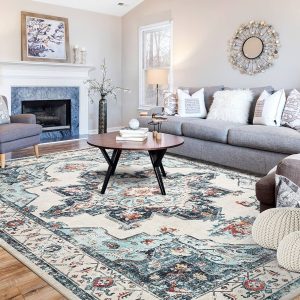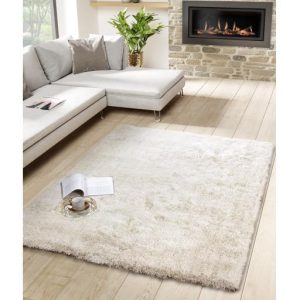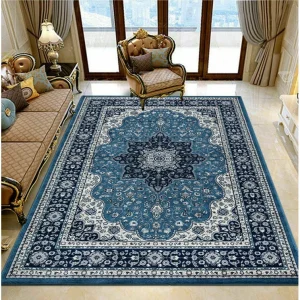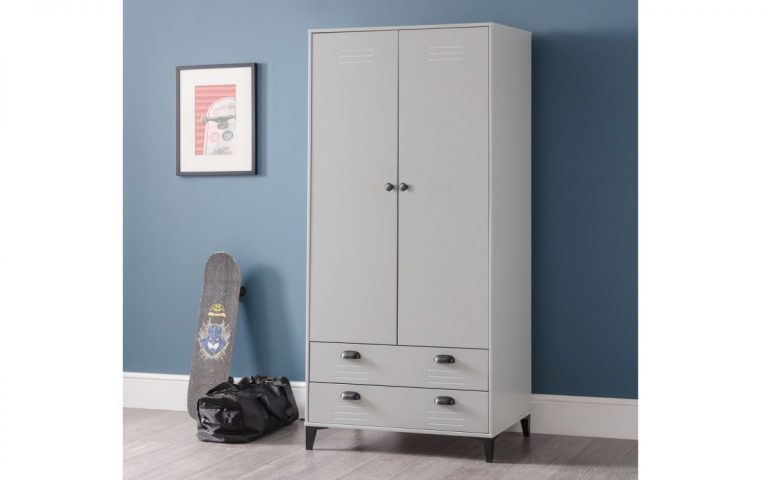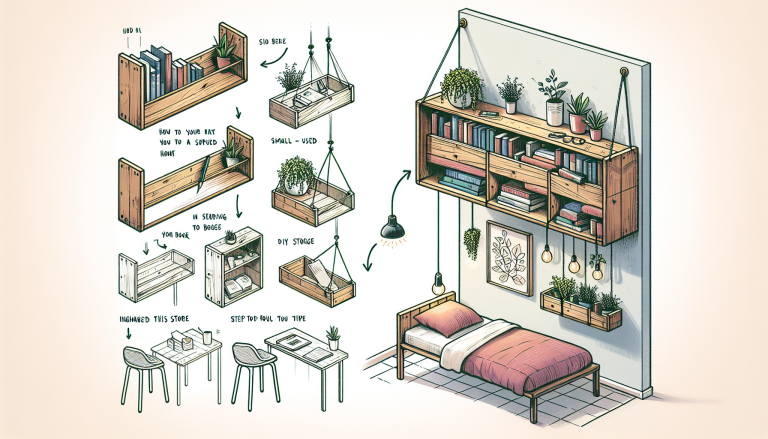Looking to enhance the ambiance and style of your living room? If so, finding the perfect area rug is essential. With countless options available, selecting the ideal rug can be a daunting task. From considering the right size and shape to finding the ideal color and pattern, there are several factors to keep in mind. In this article, we will explore some expert tips and guidelines to help you select the perfect area rug that will not only tie the room together but also reflect your personal style and taste. Get ready to transform your living room into a cozy and stylish haven!
Table of Contents
ToggleConsider the Size of Your Living Room
Measure your living room
Before selecting a rug for your living room, it’s essential to measure the space accurately. Grab a measuring tape and measure the length and width of your living room. This will help you determine the ideal size of the rug you should be looking for.
Determine the ideal rug size
Once you have the measurements of your living room, you need to decide on the ideal rug size. There are a few options depending on your preference and the layout of your room. You can choose a rug that covers the entire floor, leaving only a small border of the floor visible around the edges. Alternatively, you can go for a smaller rug that just sits under the coffee table, providing a focal point in the seating area. It’s important to consider the furniture arrangement when determining the rug size as well.
Choose a Rug Material
Consider the traffic in your living room
When selecting the material for your rug, it’s crucial to take into account the amount of foot traffic your living room typically experiences. If you have a busy household with kids and pets, you’ll want a rug that can withstand heavy use. Opt for materials like synthetic fibers, nylon, or wool, which are known for their durability. On the other hand, if your living room is more of a formal space with minimal traffic, you can consider delicate materials like silk or viscose.
Determine the desired texture and feel
Rugs come in various textures, and the one you choose should enhance the overall feel of your living room. If you’re going for a cozy and comfortable ambiance, consider plush materials like shag rugs or carpets with a high pile. For a more sophisticated look, opt for low-pile rugs or flatweave rugs that add texture without overwhelming the room.
Evaluate the sensitivity to allergens
If you or your family members have allergies or sensitivities, it’s important to choose a rug material that is hypoallergenic. Natural materials like wool or bamboo silk are naturally resistant to allergens, making them a great choice. Additionally, avoid rugs made from synthetic materials, as they can potentially trigger allergic reactions.
Consider the ease of cleaning
No matter how cautious you are, spills and accidents are bound to happen in a living room. Therefore, it’s crucial to consider the ease of cleaning when selecting a rug material. Rugs made from synthetic fibers like nylon or polyester are typically easier to clean and maintain, as they are less prone to staining and can be spot-cleaned or even machine-washed. Natural materials like wool may require professional cleaning, so take that into account when making your decision.
Decide on the Rug Style
Consider the overall style of your living room
The style of the rug should complement the overall aesthetic of your living room. If your living room has a modern and minimalist design, a rug with clean lines and geometric patterns would be a great choice. On the other hand, if your living room has a more traditional or eclectic style, opt for rugs with intricate patterns or designs that add a touch of elegance and uniqueness.
Choose a rug pattern
The pattern of the rug can greatly influence the visual impact it creates in your living room. If you have bold and vibrant furniture or wall colors, it’s best to go for a rug with a simpler pattern or a solid color to avoid overwhelming the space. On the other hand, if your living room lacks visual interest, a rug with an eye-catching pattern can be a great way to add a focal point and inject personality into the room.
Consider the rug color
When it comes to choosing the color of your rug, there are a few factors to consider. First, think about the existing color scheme of your living room and choose a rug color that complements or contrasts with it. If you want the rug to blend in seamlessly with the rest of the room, opt for a neutral color like beige, gray, or cream. Alternatively, if you want the rug to make a statement, go for a bold color or pattern that adds a pop of excitement to the space.
Set a Budget
Determine your budget
Before you start rug shopping, it’s crucial to determine your budget. Rugs can vary greatly in price, so having a clear idea of how much you’re willing to spend will help narrow down your options. Set a realistic budget that takes into account the size of your living room, the quality of the rug you desire, and your overall financial situation.
Research the average prices
To ensure you’re getting the best value for your money, take the time to research the average prices of rugs in the market. This will give you a better understanding of what to expect and help you avoid overpaying for a rug that may not be worth its price. Keep in mind that high-quality rugs made from premium materials will usually come with a higher price tag.
Consider the long-term cost
While it’s tempting to solely focus on the upfront cost of the rug, it’s important to consider the long-term cost as well. Cheaper rugs may need to be replaced more frequently, adding to the overall cost in the long run. On the other hand, investing in a high-quality rug may have a higher upfront cost but can save you money in the long term due to its durability and longevity.
Take Maintenance into Account
Consider the ease of cleaning
As mentioned earlier, the ease of cleaning is an important consideration when selecting a rug for your living room. Look for rugs that are resistant to stains and can be easily cleaned. Avoid materials that require frequent professional cleaning or are difficult to maintain, as this can become a hassle and incur additional costs.
Evaluate the durability of the rug
A living room rug is subjected to daily wear and tear, so it’s crucial to choose a rug that is durable and can withstand the demands of your household. High-quality materials like wool or synthetic fibers are known for their durability and resilience. Additionally, consider the construction of the rug and look for reinforced edges and a sturdy backing to ensure it will hold up well over time.
Look for stain-resistant options
Accidents happen, and spills are inevitable in a living room. To make your life easier, consider choosing a rug that is stain-resistant. There are various treatment options available in the market that offer added protection against stains, making it easier to clean up spills before they become permanent marks on your rug.
Consider the Thickness of the Rug
Determine the desired level of comfort
The thickness of the rug plays a significant role in the comfort it provides in your living room. Thicker rugs with a higher pile offer a softer and more cushioned feel underfoot, adding an extra layer of comfort to your space. On the other hand, thinner rugs with a low pile or flatweave are easier to maintain and may be a better option if you prefer a sleek and minimalist look.
Take into account the door clearance
When selecting the thickness of your rug, it’s important to consider the clearance of your doors. If the rug is too thick, it may prevent doors from opening and closing smoothly. Measure the distance between the bottom of your door and the floor to ensure there is enough clearance for the rug without compromising functionality.
Test the Rug in Your Living Room
Take samples or swatches home
Before making a final decision, it’s a good idea to take home samples or swatches of the rugs you are considering. Seeing the rug in your living room’s lighting and against your furniture and decor will give you a better sense of how it will look and whether it complements the space. This will also help you determine if the colors and patterns of the rug match the overall aesthetic you are aiming for.
Consider the lighting in your living room
Lighting can have a significant impact on the appearance of a rug. Natural daylight, as well as artificial lighting, can affect how the colors and patterns of the rug are perceived. It’s important to consider the lighting conditions in your living room and how they may alter the appearance of the rug throughout the day. Take note of how the rug looks in different lighting situations to ensure you are happy with its overall effect.
Choose the Right Rug Shape
Consider the furniture arrangement
The shape of the rug should complement the furniture arrangement in your living room. For a traditional seating arrangement with a sofa and chairs, a rectangular rug that extends beyond the edges of the furniture is a safe and classic choice. If you have a circular or curved seating area, a round or oval rug can help accentuate the shape and create a cohesive look. Additionally, consider the size of the room and the dimensions of your furniture when choosing the appropriate rug shape.
Choose a shape that complements the room
In addition to considering the furniture arrangement, it’s important to choose a rug shape that complements the overall shape of your living room. If your living room is square or rectangular, a rectangular or square rug would be a natural fit. On the other hand, if your living room has unique or irregular dimensions, consider a rug shape that balances out the space, such as a round or irregularly shaped rug.
Consider the Rug’s Functionality
Think about the purpose of the rug
What do you want the rug to accomplish in your living room? Is it purely decorative, or do you need it to serve a specific function, such as providing additional insulation or defining different areas in an open-concept layout? Understanding the purpose of the rug will help guide your decision-making process and ensure you choose a rug that meets your specific needs.
Consider the level of foot traffic
The level of foot traffic in your living room should also be taken into consideration when selecting a rug. High-traffic areas require rugs that can withstand frequent use and are easy to clean. Look for rugs made from durable materials and consider darker colors or patterns that can help camouflage dirt and stains between cleanings. If your living room has minimal foot traffic, you can opt for a more delicate rug that focuses on aesthetics rather than durability.
Look for Safety Features
Choose a non-slip rug pad
To prevent your rug from slipping and sliding on your floor, especially on hard surfaces like wood or tile, consider investing in a non-slip rug pad. These pads provide an extra layer of cushioning and grip, keeping your rug securely in place and reducing the risk of accidents or tripping.
Consider the thickness to prevent tripping
In addition to using a non-slip rug pad, it’s important to consider the thickness of the rug itself to prevent tripping hazards. Thicker rugs, especially those with a high pile, can pose a risk if they create an uneven surface or obstruct the smooth flow of foot traffic. Be mindful of the rug’s height and ensure it doesn’t present any tripping hazards, particularly in areas with higher foot traffic or where people might be more prone to trips, such as near doorways or walkways.
By considering the size of your living room, choosing the right rug material, style, and shape, setting a budget, taking maintenance into account, and prioritizing safety, you can confidently select the perfect area rug for your living room. Remember to measure accurately, evaluate your needs and preferences, and take the time to explore different options before making a decision. A well-chosen rug can transform your living room into a cozy and stylish space that truly reflects your personality and enhances your overall living experience. happy rug hunting!

